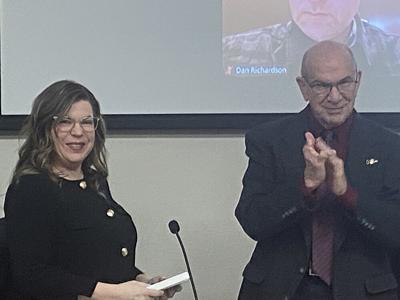THE DALLES — In a heartfelt farewell, Councilor Darcy Long stepped down from her role on The Dalles City Council at a regular meeting on Jan. 13, marking the end of an eight-year tenure.
Mayor Richard Mays led the council and community in honoring Long’s contributions.
“When you think of Darcy, the word ‘dedicated’ comes to mind,” Mays said, presenting her with an art piece depicting the city’s historic City Hall. “She’s always been very thorough, very passionate, and incredibly prepared. Darcy has been a true leader, whether it’s through her work with urban renewal or the community outreach team.”
Long, who also served as chair of the Urban Renewal Board for several years, expressed gratitude for the opportunity to serve her hometown and optimism about the council’s future.
“I feel like I’m leaving everything in great hands,” she said, welcoming incoming Councilor Ben Ring.
Long also shared her hopes for increased female representation in city leadership.
“Hopefully, someday we’ll have another female mayor. We’ve only had one in the history of The Dalles.”
Ring, along with re-elected councilors Dan Richardson and Rod Runyon, took their oaths of office during the meeting.
Ring (Position 2) and Runyon (Position 5) ran unopposed in 2024, while Richardson (Position 4) won his reelection by 59% against Debra Liddel Gomez, who took 39% of the vote.
The council also approved a $753,888 contract with Consor North America as part of an update to the city’s wastewater facilities master plan. The plan, required under Oregon regulations, will guide improvements to the city’s wastewater treatment plant over the next 20 years.
Public Works Director Dave Anderson explained the need for the update, citing ongoing operational challenges and the impact of two new data centers currently under construction.
“This plan will evaluate treatment processes, regulatory requirements, and capacity needs to develop a comprehensive 20-year capital improvement strategy,” Anderson said.
Anderson noted that new regulations from the state require the wastewater treatment facilities to manage the temperature of the warm water flowing out into Columbia River.
In response to this, the council approved a “thermal impacts analysis” to study the causes and impacts of warm water discharge and the development of a thermal trading plan.
According to the Oregon Department of Environmental Quality, water quality trading allows facilities that discharge wastewater into a stream or river to offset these pollutive qualities by buying credits used to reduce pollution elsewhere. Or, the facility can take on other initiatives to protect or restore these natural areas and deflect some of the pollutants’ impacts, such as planting vegetation in a riparian area.
Some environmental organizations have criticized Oregon’s thermal trading plans. For example, DEQ said in a 2024 report from environmental publication Columbia Insight that the state does not actually test water temperatures to see if the “traded” mitigation efforts actually cool the water.
Have you noticed stopped trains?
City Manager Matthew Klebes noted efforts to address train stoppages affecting key crossings.
“Prolonged train stoppages on First Street and Union Street have been a growing concern,” Klebes said.
Klebes said these crossings have a small square plaque with a phone number to contact the railway operator, Union Pacific, in the event of a stopped train blocking the road.
He urged residents to report incidents to Union Pacific to support the city’s advocacy efforts.























Commented
Sorry, there are no recent results for popular commented articles.